INTRODUCTION
Health is a very complex phenomenon influenced directly or indirectly by several, known and unknown, factors.Understanding these factors is essential for equitable health services planning and effective treatment delivery. With these issues in mind, the Centre for Culture and Development (CCD), Vadodara, organised a two-day National Seminar on Moving towards an Equitable Health System in India-Key Issues and Challenges.
Prof. A. M. Shah, Prof.Ghanshyam Shah, and Prof. Nirmal Gurbani; Prof. Lancy Lobo, and Mrs. Renu Khanna inaugurated the seminar by lighting the ceremonial lamp. It was followed by Prof. Lobo’s welcome address as Director of the Centre for Culture and Development. He greeted all the participants and dignitaries of the seminar and introduced them to the activities of the Centre. He highlighted the research-based activities carried out at the Centre on such socio-political issues as tribe, caste,religion, and communalism; elections and environment; health and migration. It was followed by a round of self-introduction by the participants of the seminar.
In his introduction to the theme of the national seminar, Prof. Lobo highlighted the main global burden of disease and the major causes of health inequities within and between different nation-states, arising from circumstances in which people are born, grow, and live; work and age. He stated that health inequity is a greater challenge in developing countries like India due to economic,social, and cultural inequalities. He emphasised the bi-directional interaction between inequality and inequity, less systematic preparedness to address inequity due to resource-constraints, including lack of awareness, which lead further to health inequity; and so, an equitable health policy approach would be necessary in India for good, health-related information and health care.
Prof. Lobo pointed out that despite significant achievements in overall health status of populations and improvement in health system indicators, achieving health equity has eluded the global millennial target for good health systems. He stressed that focus on human life, health, and behaviour through statistics alone cannot satisfy social concerns that influence health outcomes; although necessary, it is not the most effective way for health promotion.
Discussing the seminar theme further, he proposed a set of questions for reflection and discussion in the seminar in the area of health care agents involved in the health system.In his view, public health has to move forward and develop better ways of dealing with the burden of diseases, primarily, within the social-economic frame. Trans-disciplinary approach to health, which integrates different sectors and involves multiple stake-holders, is the need of the hour, he insisted.
In his inaugural address of the seminar Prof. Ghanshyam Shah remarked, when looking at the subject of equitable health system, one has to look at questions of what would be an equitable health system, how much we have moved forward and how far we still need to go in this matter. He pointed out that international discourse on health considers health as a fundamental human right. Accessibility,availability and the quality of health constitute health care as a human right.In his opinion, health inequity arises not only from within but also from other,external factors because it is not just a bio-physiological and medical matter.Factors such as income, education, and power, too, play an important role in promoting health equity. He raised many other important points concerning the health-care system namely, lack of health security coverage (especially in the informal sector), hunger and malnourishment among children; huge expenditure on health and a sense of insecurity among households, shortage of medical staff in health centres, and so on. A great concern, he emphasised, is the issue of corruption and malpractices in the medical field: in public and private clinics, hospitals,and pharmaceutical companies. Irrational prescription of drugs by private doctors and unaffordable prices of drugs, too, speak for corrupt interaction between the two, he noted.
SESSION ONE: ACHIEVING HEALTH EQUITY
The first session of the seminar was chaired by Prof. Ghanshyam Shah. With some introductory observations on the theme of the session, he invited the speakers to present their papers. His introductory remarks were followed by three presentations.
In his path-breaking paper, Moving towards Equitable Health System in India: Access to Quality Medicines, Prof. Nirmal Kumar Gurbani explained that right to health goes simultaneously with access to essential medicines. Proper health care is impossible without access to essential and reasonably priced medicines. While talking about saving lives through right to medicines in terms of its access at the practical level, he highlighted four important points: rational selection and use, affordable prices, sustainable financing, and a reliable medicine supply system. He pointed out that, though India is considered the leading,global pharmacy for developing countries, access to medicines in India is still elusive for reasons of inadequacy of public spending on health care, inefficient procurement and distribution mechanisms of even essential medicines; unaffordable market prices, irrational prescription and use of medicines, and the tilt of markets towards branded drugs.
While describing people’s access to medicines, he highlighted certain major problems in their access:medicines beyond the reach of the people, expenditure on medicines further impoverishing the poor, promotion of non-essential drugs, and, lastly,overpricing and differential drug pricing.
Talking about the Rajasthan Medical Services Corporation(RMSC) his paper underlined the way RMSC, by adopting and improving on the Tamil Nadu model and despite daunting challenges, has made it possible to provide free access to medicines to people, especially the deserving poor. Coupled with proper educational, managerial, and regulatory interventions, and strong political will, RMSC has made it possible to bring about positive changes in enhancing affordable access to quality medicines and universal health.
Prof. Vijay Kumar’s paper, Health Care in India: An Overview,outlined how huge and complex in magnitude India’s health care challenges are because of its large and diverse population, chronic poverty and inequality.The paper emphasised the urgent need to address certain emerging health issues such as new, non-communicable diseases, HIV and (AIDS) along with old problems of communicable diseases and high maternal and infant mortality rates. Added to it were the health problems of the growing numbers of the aged population. Prof.Kumar also talked about various challenges of health care in India: for instance, the burden of infectious diseases; reproductive, child health care and nutritional problems, chronic diseases and injuries; universal access to healthcare, health care human resources, health care finances, and so on. While discussing the National Health Policy2015, he put forwarded a few suggestions for the policy principles: universal access and patient-centred quality care; inclusive partnerships, accountability,professionalism; integrity and ethics, and achieving reduction in out-of-pocket,private expenditure etc.
In his paper on Providing Health Care for All Gautam Gupta looked at the dynamics of whether health and development could be seen as being interdependent? He argued that health care is both a consumption good that yields direct utility and satisfaction and an investment good which yields indirect satisfaction to consumers through increased productivity, fewer sick days, and higher wages. Through various landmark judicial judgments, his paper showed,health and health care has been recognised as a fundamental right. He emphasized special concern towards primary and curative health care by highlighting some of the available health care programmes. As recommendations for health-for-all programme he pointed out the need to increase the number of doctors and paramedical personnel in health institutions, promotion of health behaviour by focussing on public health, harnessing of technology to bridge the delivery gap by developing tele-medicine infrastructure, along with the frequent use of tele-nursing and tele-pharmacy.
Dr. Edmund Fernandes’s paper on Bridging the World’s Divide:From Humanities to Health raised an important point by showing how healthcare remains closely connected today with Humanities like never before. He argued that in our own times it is important to interlink health and humanities to achieve sustainable development and growth as laid down by UN sustainable development goals, because there is a change in the dynamics of diseases. According to him a framework for Humanities and health serves two purposes namely, it guides empirical work to enhance understanding and policy making by illuminating the entry points for interventions. In his opinion it is necessary to create platforms for health and Humanities to intersect and work together so that it creates inter generational solidarity. He also stated that economic stability, education, and social justice are some of the major factors that influence the outcomes of human well-being. For any fruitful outcome we should expect a nation’s policies to be in this direction.
Sunita Sangar’s paper, Addressing Women’s Health beyond Reproductive Care, stressed upon several areas that need to be strengthened in the health policy keeping women’s perspective in view. While the disadvantages experienced by women in sectors like education, employment or political participation are evident from available data, it is important to recognize that the case of health is much more complex. Since male mortality exceeds female mortality, many policy makers and programme managers remain sceptical about any gender- based inequality in health care and the need for gender mainstreaming. Her presentation highlighted many important reasons for looking beyond the reproductive healthcare among women namely, the differences in conditions experienced by men and women, living with disability and disease due to increased dependency and poor supportive measures; burden of diseases due to their social position and social problems; and non–communicative diseases (NCDs) impacting major proportion of women in India, and so on. For her, the need of the hour is to look at women’s health issues and challenges in a life-cycle approach and to formulate a health policy responsive to the women’s health needs by taking into account health promotion and disease prevention.
SESSION TWO:SOCIAL DETERMINANTS OF HEALTH
The second session chaired by Prof. P. M. Patel focused on the issue of Social Determinants of Health: Their Role for Equity in Health. After the moderator’s introduction on social determinants of health in their role for equity in health, and his personal remarks, two presentations in this session discussed different dimensions of social health for equity in health care.
Talking about the renewed understanding of health systems as core social institutions, Arima Mishra’s paper, Trust and Power in Health Systems: Why Does it Matter, discussed about the relevance of trust and power in health system delivery through the experience of community health workers. According to her health system is essentially relational which facilitates an interpretative understanding of health. Drawing on everyday experiences of community health workers in south Odisha, she discussed how the workers consider trust in the community as central to their efforts to strengthen primary health care and it is a process to build trust with the community through cooperation as a facilitator to receive or approach ANM or PHC. However, being located in the lowest rungs of the primary health care structure, the health workers often struggle to meet the demands of the community and the health system as a challenge. She said that, while trust building legitimizes their role as good health workers among community members,such processes are rendered invisible due to the hierarchical nature of health bureaucracy.
Shyam Pingle’s paper on Basic Occupational health: A Key Issue for Equitable Health in India highlighted the important facet of occupational health that, according to World Health Organisation, refers to physical, mental and social well-being of individuals in relation to their work and work environment. It was argued that every human being is engaged in some or other occupation and, hence, is subjected to occupational health hazards. It was suggested that consequent occupational diseases usually do not have a cure,but are preventable. The paper discussed about the basic occupational health services as an application of the primary health care principles in the sector of occupational health. Occupational health services (OHS) are available worldwide to miniscule working population but their quality and relevance is very limited and low. The paper also suggested that there are three important occupational health services needs namely, legislation to extend its coverage to all sectors of working life; spreading awareness about occupational health services, and the development of OHS infrastructure and OHS professionals and integration of occupational health with primary health care. The paper concluded with a caution that the equitable health system in India cannot be achieved unless the lack of basic occupational health facilities for all the working population are addressed and without great delay.
PANEL DISCUSSION ONE: HEALTH AND HUMANITY
After the two sessions of the first day, a panel discussion was held on the topic Health and Humanity: Agents for Sustainable Development. Prof. Dr. William Robert Da Silva moderated the panel discussion. After introducing the theme of the panel discussion, he called upon the panellists to introduce themselves and make brief statements about their special fields of health care engagement. The four panellists for the session were Dr. Rajesh Kantharia of Muni Seva Ashram, Goraj; Dr. Pankaj Shah from Sewa Rural, Zagadia; Mrs.Archana Joshi from Deepak Foundation, Vadodara, and Dr. Arima Mishra. Some of the major points that came up for panel discussion were related to the challenges and outcomes that panellists had experienced over time in their work on Health and Humanity through their health and health care organizations. These included: 1. Addressing the opportunity and accessibility to health care facilities largely for the deprived groups, 2. NGOs and civil society providing comprehensive care to patients irrespective of caste, creed or region, 3. Civil society work as an instrument of societal change in healthcare in society, 4. Challenges of facing resistance from the state, 5. Challenges of getting good medical professionals willing to serve in rural areas, 6. Challenges of sustaining health care programmes by civil society organizations that require collaborating with the best minds at work along with better finances,7. Shrinking spaces of partnership in terms of lack of communication and planning on the part of state institutions of the Union and State Governments,8. Lack of any representation for civil society groups in policy thinking,planning and implementation, 9. Recent opening up among higher health officials in approaching civil society organizations,10. A major gap in incorporating community groups to raise their voices for their health needs, 11. Need of public-private partnership in addressing health and health care issues, 12. Special push required for preventive health care in health care system, and 13. Civil society‘s engagement in developing models of public-private partnerships which could be replicated elsewhere.
SESSION THREE: HEALTH STATUS AND RISK FACTORS
The second day had two sessions namely, sessions three and four of the seminar. The session three was on the theme of Health Status and Risk Factors: Issues and Challenges. It was chaired by Dr. Edmond Fernandes and had three papers. After Dr. Fernandes’ initial remarks on health status and risk factors in India’s health care system, all three papers were presented. It was followed by discussion between the participants and the paper presenters.
In her paper Measurements of Inequalities of Health Care Delivery in India: A Preliminary Analysis Ms. K. N. Anushree said that availability of health facilities with right skill-mix health work-force is considered an essential part of health care system. However, the reality of the country is an acute shortage of right skill-mix health work-force at different levels of health care along with huge disparity in the distribution of health work-force and health facilities. Her paper also examined the extent of such inequalities in the distribution of health facilities, health work-force, and its impact on specific health outcomes. She also highlighted the imbalances in the distributions of doctors in comparison with nurses, rectifying which was necessary for better health outcome.
Jagdish Patel’s paper on Inequality in Occupational Health in India tried to investigate the presence of inequality in occupational health in Indian context. It was cautioned that occupational health is important aspect of public health but it is one area that has not received attention. It is mainly because of the problem of state ministry of labour or environment overtaking the responsibility of it. As a concern the paper also reported that medical education does not give adequate space and importance to occupational health in their curriculum. Even for the diagnosis of occupational diseases one does not find an OPD in any public or private hospital. In his opinion, no diagnosis leads to any recording of data and, hence, no reliable data on occupational health is available. Another point was also made stating that there are various national-level programmes on various health issues such as TB, HIV/AIDs etc., but nothing meaningful and useful on occupational health.
The paper by Dhananjay Kumar on Exploring Linkages between Agro technology and Public Health with Emphasis on Health Risks highlighted that agricultural technologies comprises an important and enviable part of the agricultural process. Tremendous change has happened in the agro technology as well in public health context from the starting of the agriculture to the coming of the biotechnology in food production in more recent times. The adoption of the new technologies in agricultural system brings rise in productivity, provide employment and income to rural population. It also increase local and global food supplies. However, agricultural mechanization also had some occupational hazards in terms of pains, injuries and poor health conditions. The paper concluded with a point that management of agro technology is important but it is equally required to create more awareness and its practice method. Also to understand and attain full goal of more production other technological aspect such as nanotechnology and biotechnology in agriculture and their linkage with health should be studied.
SESSION FOUR:HEALTH, MIGRATION AND NATIONAL DISPARITIES
The session four of the second day focused on the theme of Health, Migration and Regional Disparities.It was chaired by Prof. Nirmal Kumar Gurbani and had three presentations.
The first paper by Bal Govind Chauhan on Factors Affecting the Utilization of Maternal Health Care Services in Selected Tribal Dominated States of India highlighted the issues of provision of maternal and child health care as a key strategy for reducing mother and child mortality. The paper attempted to examine the factors affecting the utilization of maternal health care services in some selected states concentrated in tribal regions of India and concerned with tribal population. The paper emphasized the economic status, education, and media exposure of these concerned issues and household member covered under any health schemes are the main predictors for utilization of maternal health care services. It is also brought out the fact that compared to other caste groups tribal population are less likely to utilize the maternal and child health care services of full antenatal care and post natal care. The inequalities or differences in terms of availability and accessibility of health services in the tribal areas plays significant role in under or non-utilization of services related to mother and child. In his view efforts are needed to understand the needs and expectations of the local communities and the cultural practices to enhance the utilization of health services.
Homolata Borah in her paper looked at how domestic violence faced by women acts as barrier to seek health for them. It is stated that variables such as marital duration, age of women, education and occupational status, place of residence in rural or urban, distance to medical centre, no provider etc. plays dominant role that constraints and controls the utilization of health care services by women who have experienced any form of violence. Her presentation also attempted to seek the explanation to questions pertaining to the missing interface between the women victims and the delivery of health care services. She also raised concern for identifying the barriers such as the shortage of human resources for health, lack of gender sensitization among the healthcare providers and lack of linkage and integration in current provisions of women in the attainment of health care services by the women facing domestic violence. For her,recognizing women as central figure in the healthcare provisions in India requires serious attention.
The last paper by Khushboo Chauhan on A Comparative Study of the National Rural Health Mission in the Districts of Mandya and Mysore in Karnataka looked at the role of the state as provider of welfare to its people through various socio–economic welfare schemes and projects. It mentioned that lately the role of the state is continuously reducing itself and losing its touch with the needs and demands of the common people. While discussing about the NRHM and the available evidence, she pointed out to certain challenges that various rural health services are confronting. Poor infrastructure, shortage of medical supplies and staff, ill-equipped health centres, lack of education, exposure and sensitization, lack of knowledge regarding public health laws, lack of systematic monitoring mechanisms etc. These are key challenging issues, she said. For better results of rural health services under NRHM in the state of Karnataka, she put forward some recommendations such as increase in or fixed remuneration, more active role of the state government, availability of basic facilities, administration reforms,integrated health policy, and also active collaboration between NGOs and the civil society.
PANEL DISCUSSION TWO: HEALTH AND HUMANITY
The panel discussion on the second day was on the theme of Role of Indigenous Knowledge in Social Determinants of Health. The discussion was moderated by Dr. Sunil D’Souza and had four panellists namely, Dr. Lancy D’Cruz, Principal of St. Xavier’s College; Dr. Sister Lissy, Mrs. Renu Khanna, Sahaj, Vadodara and Dr. Ripudaman Singh Chauhan from the Institute of Naturopathy, Vadodara. All the panellists were experts in different field of indigenous medical in India. The ensuing discussion brought out and raised the following issues: 1. The saturation of modern medicine with its various limitations and the rise of alternative indigenous medicines, 2. Tribal areas are a treasure house of thousands of medicinal plants but, the loss of forests is disrupting and destroying this stock of medicinal knowledge, 3. Rediscovering the indigenous medicines, especially among the tribal people who have lately shifted to allopathy, 4. Motivating the tribals, especially women, to understand the significance of indigenous medicinal plants, 5. Production of indigenous medicines through their awareness on the availability of local herbal plants, 6. The importance of naturopathy, 7. Interlinks between sympathy, healing and naturopathic cure, 8. Linking the economical aspects with the system of indigenous medical knowledge, 9. Diversifying indigenous medical knowledge by branding and sale of indigenous medical products, 9. The web of market economy and its advantages and disadvantages on indigenous medicines or products, 10. The mismatch between knowledge acquired vis-a-visits practice, and 11. The challenge of documenting the tribal medical knowledge and its immense resources for continued tribal health.
The discussion after all the presentations in all the four sessions are important questions and issues that needs our attention. Some of these questions are issues for further reflection and research. They are: 1. Addressing the inequalities of healthcare and health system, 2. Issues and challenges of accessibility and affordability of health services to the people, 3. Access to universal healthcare very important because it would take care of inter-sectional needs of various individual and groups, 4. Special consideration for occupational health at various levels of reporting, diagnosing and in programmes and policies, 5. Need of a powerful and well educated work-force in health centres, 6. Gender mainstreaming in health discourse at various levels, 7. Macro-micro linkages related to health care in terms of accessibility and affordability to be brought into frequent discussions, 8. Understanding felt needs at higher level versus unmet needs at local level in the arena of health care in terms of formation of health programs and policies, 9. The role of indigenous and alternative medicine in the domain of health system and health care.
In sum, these four sessions of the national seminar was an intensive academic attempt at locating and discussing emerging issues on the subject of health system and health care.It initiated concern over some prominent issues and challenges within the domain of health vis-a-vis other dimensions that require further exploration and rigorous research, especially in many of the neglected areas.
CONCLUDING SESSION: HUMANITY AND HEALTH
The concluding session of the seminar was presided over by Prof. A. M. Shah, Prof. J. S. Bandukwala, and Prof. Lancy Lobo. Prof. Lobo introduced Prof. Da Silva and Professor Dr. William Robert Da Silva, in his concluding remarks, briefly summarised the concerns of the two-day seminar and spoke about an evolutionary, historical, and developmental perspective within which he located human life, health and survival in evolution as continuity and inequality as a non-linear, but forward moving case until today. This was his vision of the past of human life and health and vice versa. The most important point he made was that vis-a-vis the present systems of medicine and health care people, the modern man or Homo sapiens, equated life, health and survival. The system of healing humankind developed then was of such a nature that, in a period of about a hundred thousand years or more, he survived and we are the generations of that survival! There was no Ayurveda, Siddha, Unani, homeopathy or allopathy then;there was no Chinese medicine, or of any other civilisation. But humankind survived with his, what we today call, ‘primitive’ medical system. Nourish mentor nutrition associated with health care, with medicine, saved human kind. Can we at present return to health care than medical care as a priority, so that we survive and create a future for ourselves! The market and profit economy is compromising this promise and we are victims of this ‘human greed.’ We need another future with life, health and medicine. We need to relive the past in order to create a healthy future.
Dr. Jayesh Shah’s vote of thanks brought the national seminar on MOVING TOWARDS EQUITABLE HEALTH SYSTEM IN INDIA with emphasis on key issues and challenges to a close.

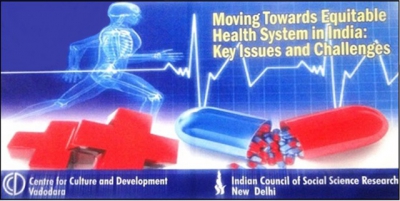
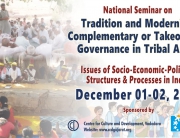
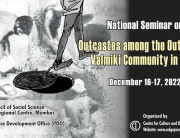
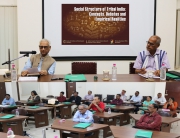
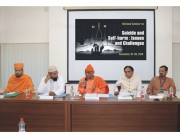
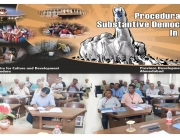
Add Comment